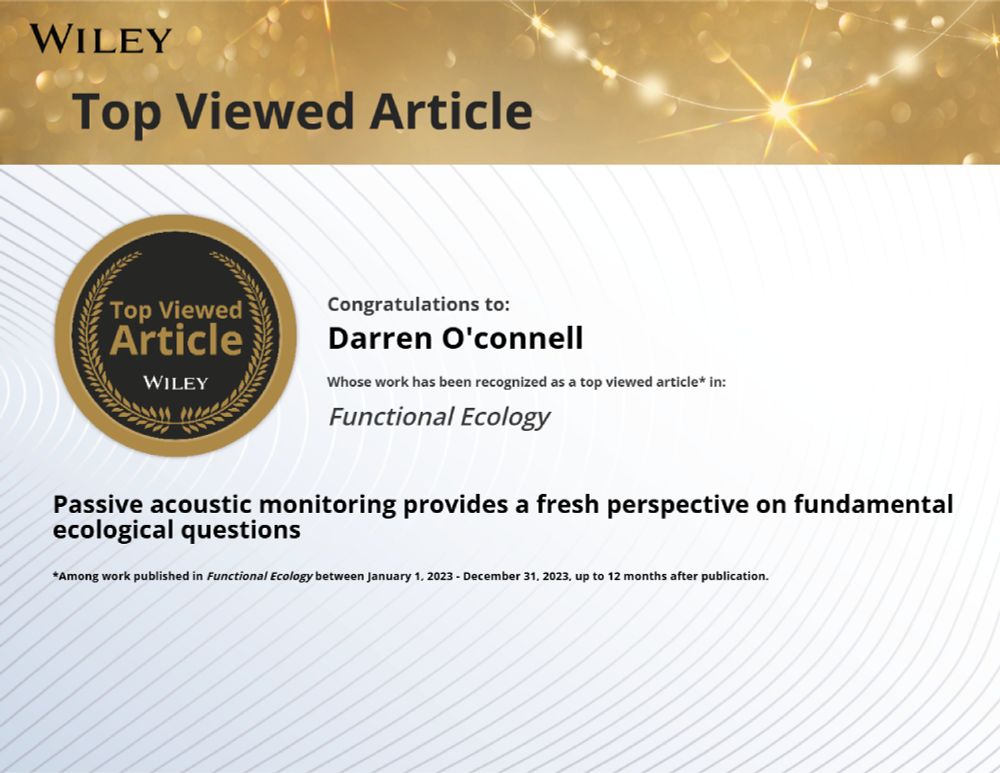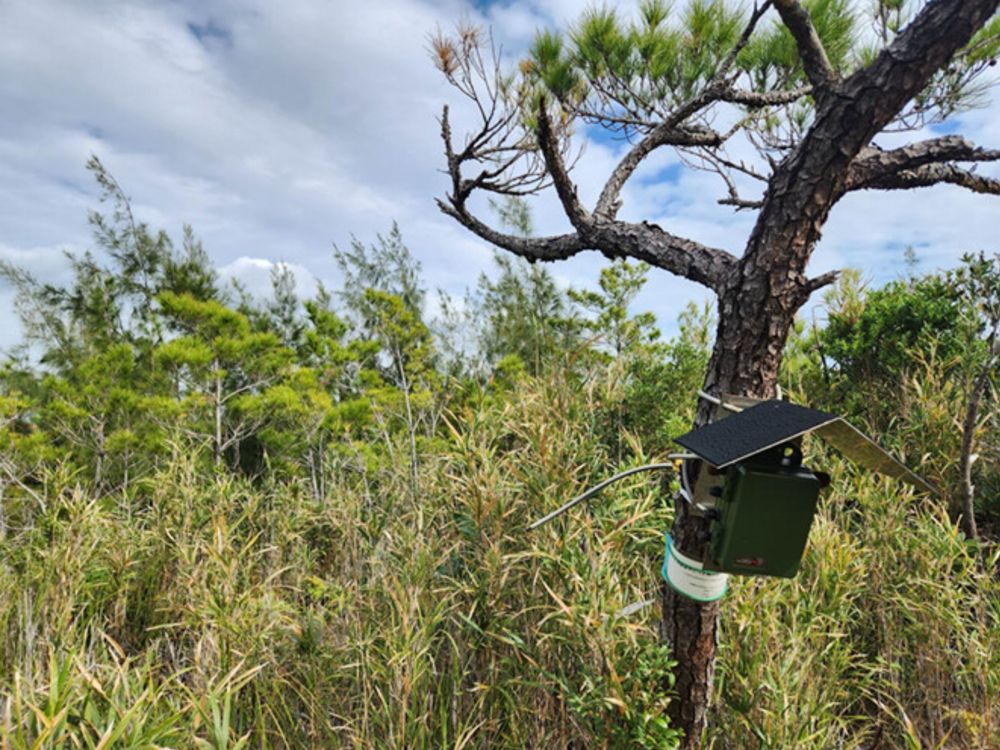Last chance to apply for this PhD opportunity ➡️ bit.ly/CurlewPhD
Closing date: Wednesday 18 February #Ornithology
13.02.2026 10:53 — 👍 17 🔁 16 💬 0 📌 0
Cool PhD with a great supervisor! #Phd #insects #spiders 🧪
03.02.2026 11:37 — 👍 4 🔁 2 💬 0 📌 0
Despite decades of effort, scientists have still not discovered a foolproof way to evaluate colleagues’ work that doesn’t involve reading the paper
27.10.2025 14:21 — 👍 39 🔁 13 💬 0 📌 1

Black labels indicate absolute biomass estimates, gray labels indicate the fraction of the total estimated biomass of mammals (see Fig. S9 for the estimated fraction of global biomass). Top: the total biomass of humans and domesticated mammals (cattle, buffalo, swine and others). Bottom: the total biomass of wild marine mammals, along with a coarse, preliminary estimate of the total biomass of wild land mammals, based on previously published temporal abundance estimates.
Fascinating graph shows the estimated total mass of all the mammals living on Earth.
In 1850, it was evenly divided between wildlife and humans + domesticated animals. Today, humans and their livestock account for about 95% of the total. 🧪
www.nature.com/articles/s41...
30.10.2025 13:58 — 👍 81 🔁 39 💬 6 📌 7

Delighted to be highlighted as one of the most read authors in the @britishecologicalsociety.org journal @funecology.bsky.social 🧪
This follows being higlighted as a #TopCitedArticle last month. Great to see we're having influence
#ecology #acoustics #TopViewedArticle
@ucddublin.bsky.social
1/2
02.05.2025 16:41 — 👍 5 🔁 0 💬 1 📌 0

Delighted to be highlighted as one of the most read authors in the @britishecologicalsociety.org journal
@funecology.bsky.social!
This follows being higlighted as a #TopCitedArticle last month. Great to see we're having influence!
#ecology #acoustics #TopViewedArticle @ucddublin.bsky.social
1/2
02.05.2025 08:50 — 👍 5 🔁 1 💬 1 📌 0
We are risking plunging the United States into a dark age of entomology next week. USDA programs are facing massive lay-offs next week and the public should be aware of the impact. If you care about food systems, forests, invasive species, this thread is for you. Read Below: 🧪 #entomology #science
06.04.2025 11:49 — 👍 494 🔁 256 💬 11 📌 20

Delighted to be highlighted as one of the most cited authors in the @britishecologicalsociety.org journal @funecology.bsky.social in recent years!
#ecology #acoustics @ucddublin.bsky.social 1/2
19.03.2025 20:33 — 👍 5 🔁 0 💬 2 📌 0

Optimising testing and control strategies in the early stages of infectious disease outbreaks
Supervisors: Dr Emily Nixon Professor Christl Donnelly Dr Richard Vipond Dr Emily Adams
Research area:
Maths and Computing
Studying in:
Department of Mathematical Sciences School of Physical Sciences Faculty of Science and Engineering
Stipend Amount: Funded studentship
Availability Region: Open to UK applicants
Application Deadline: 24 March 2025

In the early stages of a major disease outbreak, the availability of suitable diagnostic tests is often limited, however, timely interventions are critical for controlling the spread of disease. In this PhD, you will develop mechanistic and statistical models to investigate the effectiveness of various diagnostic test deployment strategies for emerging and zoonotic diseases which are at risk of causing large outbreaks, such as respiratory viruses (Influenza, SARS-CoV-2, Respiratory syncytial virus), vector-borne diseases (Dengue, Tick-borne encephalitis) or viral haemorrhagic fevers (Nipah, Lassa fever and Crimean-Congo haemorrhagic fever). You will investigate the effectiveness of targeting use of tests in different settings, for example in areas of high versus low transmission, or in hospitals versus the community. The optimum strategy for diagnostic test deployment will vary depending on prevalence of disease, the sensitivity and specificity of the tests and the time it takes to receive and act on results. In addition, variation between pathogens, for example, in their mode of transmission, reproduction number and incubation period, will influence which strategy is the most effective in controlling the impact of the outbreak. These insights will inform stockpiling strategies of medical countermeasures for pandemic preparedness and in the event of a major outbreak, can be used and adapted to help inform decision making.

You will be part of a supportive and stimulating research environment at the University of Liverpool, with Dr Emily Nixon as your primary supervisor, with additional supervision from Professor Christl Donnelly (Department of Statistics, University of Oxford), Dr Emily Adams (Pandemic Sciences Institute, University of Oxford) and Dr Richard Vipond (UK Health Security Agency). This studentship will be for a maximum of 3.5 years duration starting in October 2025; it includes fees at the UK/home rate, stipend, and research-related travel.

This is an exciting opportunity to work with a world leading team delivering research that is relevant to public health in the UK. This PhD opportunity is funded by the National Institute for Health and Social Care Research (NIHR) Health Protection Research Unit (HPRU) in Emerging and Zoonotic Infections (EZI). The successful candidate will therefore join the NIHR HPRU-EZI.
NIHR is the UK's largest funder of health and care research and provides the people, facilities and technology that enables research to thrive.
NIHR HPRUs undertake high quality research that enhances the ability of the UK Health Security Agency (UKHSA) to protect the public’s health and minimise the health impact of emergencies. There are 13 HPRUs across England.
The HPRU-EZI is a partnership between the University of Liverpool, Liverpool School of Tropical Medicine (LSTM), University of Oxford, London School of Hygiene & Tropical Medicine and UKHSA, in collaboration with University of Glasgow. HPRU-EZI has been running since 2014, and supports and strengthens UKHSA in its role protecting England from emerging infections and zoonoses (i.e. those which spread from animals to humans). HPRU-EZI has played significant roles in the past in the UK response to Ebola, Zika, COVID-19 and mpox. We will continue to address the major emerging threats; these are transmitted by mosquitoes and ticks (e.g. dengue and Lyme), the respiratory route (e.g. COVID-19 and influenza), or directly through contact (e.g. Lassa fever).
For further details please see our brochure and our website: http://hpruezi.nihr.ac.uk/media/artlflhc/hpru-ezi-brochure.pdf http://hpruezi.nihr.ac.uk/
📣 Funded 3.5yr PhD opportunity for UK applicants in @hpruezi.bsky.social @liverpooluni.bsky.social. #PhDSky
🧪 On "Optimising testing & control strategies in the early stages of infectious disease outbreaks" #IDSky #EpiSky
⏳ Application deadline: 24 Mar 2025
🔗: www.liverpool.ac.uk/study/postgr...
24.02.2025 18:22 — 👍 5 🔁 3 💬 0 📌 0

24 February tackling varroa mite
Check out our new blog summarising recent meta-analysis assessing treatments for the Varroa mite #pathogen of honey bees!
This #invasive #parasite has huge impacts on crops from lost
#pollination 🧪
@ucddublin.bsky.social @healyke.bsky.social @cristinabotias.bsky.social
www.ucd.ie/earth/news-o...
24.02.2025 16:46 — 👍 10 🔁 2 💬 0 📌 0
Also we've highlighted general issues with how data is reported. It's harder than it should be to do a comparative analysis, probably due to a lack of unified reporting standards.
Which has limited our capacity to get as specific as we'd like to (i.e. analysing dosage)
So plenty more work to do!
20.01.2025 18:48 — 👍 1 🔁 0 💬 0 📌 0
As much as anything it's allowed us to highlight where data is lacking;
Honey bee health metrics are measured way less than mite mortality. Particularly longer term health (if it's measured it's usually something short term).
Controlled studies of options like resistant bee strains.
Bee genotype
20.01.2025 18:43 — 👍 2 🔁 0 💬 1 📌 0
In terms of how we're measuring the efficacy. We're working with what has been previously published, so what we can do reflects that.
Mite count (Varroa mortality) is one analysis we've done. There's a big focus on that in the published literature
We've looked at other metrics also
20.01.2025 18:43 — 👍 1 🔁 0 💬 2 📌 0
Does this link work doi.org/10.1016/j.sc...?
Maybe also google the DOI: 10.1016/j.scitotenv.2024.178228
If not my institution should be putting out a summary blog on it later this week, I'll share it. Character limits here are tight!
20.01.2025 18:35 — 👍 0 🔁 0 💬 0 📌 0

A systematic meta-analysis of the efficacy of treatments for a global honey bee pathogen - the Varroa mite
The western honey bee Apis mellifera is the world's most important managed pollinator. However, globally honey bees have been facing increasing colony…
Our new meta-analysis assessing treatments for the Varroa mite #pathogen of honey bees!
This #invasive #parasite has huge impacts on crops from lost
#pollination
We synthesise the best options and future prospects 🧪
@ucddublin.bsky.social @healyke.bsky.social
www.sciencedirect.com/science/arti...
20.01.2025 12:38 — 👍 6 🔁 2 💬 1 📌 0
Musk's "interference" is not a party political issue, she says, but one of "spreading disinformation in an attempt to interfere with our democracy", Dorothy Bishop tells me.
Thanks to @deevybee.bsky.social, @scurry.bsky.social & @mikegalsworthy.bsky.social for speaking to me about this.
10.01.2025 15:14 — 👍 16 🔁 14 💬 1 📌 0
The Integration of Speciation network aims to facilitate discussion and promote knowledge exchange between all corners of speciation research, including through our virtual seminar series. Find out more: https://speciation-network.pages.ist.ac.at/
We are the British Ecological Society Macroecology & Macroevolution Special Interest Group. We run the annual #BESMacro conference and will gladly repost papers and opportunities of interest to our members!
PhD student at UConn EEB || NSF GRFP Fellow ||Inverts, Genomics, Evolution and Science Communication || 🇵🇷🏳️🌈
A grant giving Trust, aiming to advance the understanding of bees and beekeeping.
Evolutionary biologist at Academy of Natural Sciences of Drexel U (Philadelphia). Ornithology. Evolutionary genomics. Speciation. Dachshund dad and human dad!
Studying why and how behavior evolves, from mosquitoes to mole-rats | Postdoc/Leon Levy Scholar @Columbia working with Ishmail Abdus-Saboor | PhD @Princeton with Lindy McBride | 麻布/東大 alum 🇯🇵 | yukihaba.github.io
@Jordan.Chetcuti
(he/him)
#Bee #Bird #Landscape #Researcher @aarhusuni.bsky.social #Ecology agent-based modelling #GIS #RemoteSensing Habitat asso/SDM's
Former @tcddublin.bsky.social @ukceh.bsky.social, Forest Research
Uni Leeds, Hawaii & Stirling
Assistant Prof | Environmental Biology & Sustainability @maynoothuni.bsky.social
Ecologist | lab website: https://dirilgenecology.com/
Affiliate @UCDEarth | Exec Group @aicbrn.bsky.social | Alumnus @IrishResearch @UCDSBES
Integrating medicine & conservation in Papua New Guinea + improving scabies control in Britain & Ethiopia @bsmsmedschool.bsky.social. Visiting Professor, KazNU. Chair, @wildhealthcic.bsky.social. Views own
https://linktr.ee/DrJMiddleton
Wildlife Community for those who care about species & habitat conservation. Photography, Art, Videos of Birds,Mammals,Reptiles,Plants,insects
https://www.facebook.com/profile.php?id=61578489868735
https://www.tiktok.com/@wildlife.net?_t=ZN-8yV9vhsHk0c&_r=1
Scientific content aggregator with custom content feeds. Science news, jobs, events and more. Sign up at https://www.scientific.today.
Professor of Applied Ecology @ University of East Anglia. Bird migration, ecology, conservation, waders. Born @ 323ppm. http://wadertales.wordpress.com
Bringing together researchers across the island of Ireland to tackle the #climate and #biodiversity emergencies.
Supported by the Department of Housing, Local Government and Heritage through @npwsireland.bsky.social.
www.aicbrn.net
Herpetology postdoctoral fellow @NWU_UESM. Snakes!! Everything about them, all conservation science stuff, and plenty of banter. IG cormac_is_out_of_the_office Shutterstock https://www.shutterstock.com/g/Cormac_Price?sort=newest
Forest ecology, ornithology, molecular and microbial ecology 🐦🦠
BTO C Ringer
She/her
Lecturer | Department of Animal | @HartpuryAnimal | Harpury University | @hartpury #EcosystemEngineers #CommunityEcology #Ornithology
Wij bestuderen al meer dan 200 jaar het leven op aarde. Klein en groot. Springlevend of miljoenen jaren dood. En dat is nu belangrijker dan ooit.
www.naturalis.nl
Bringing together people interested in #parasite and #pathogen ecology and evolution.
Chair:
Louise Cheynel @louisecheynel.bsky.social
Amy Sweeny @arsweeny.bsky.social
https://parasite-and-pathogens-group.mailchimpsites.com/
















